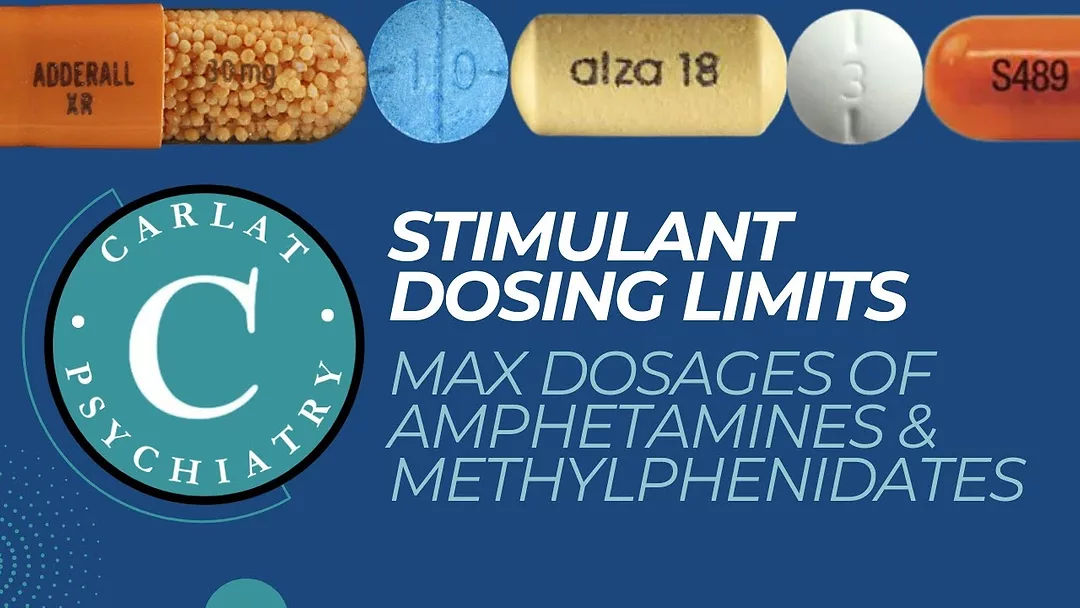In this comprehensive video, we delve into the critical topic of ADHD medications and the complexities surrounding stimulant dosing limits. For many individuals with ADHD, stimulant medications like Adderall and methylphenidate (Ritalin) can significantly improve focus, productivity, and overall functioning. In this video, we aim to break down where the safe upper limits lie, what to consider when increasing doses, and why crossing certain thresholds can lead to serious risks. We start by discussing why increasing stimulant doses beyond a certain point can be dangerous.
Higher doses, while sometimes necessary for symptom control in severe cases, raise the risk of abuse, diversion, and cardiovascular issues, including hypertension, stroke, and myocardial infarction. We also explore the cognitive side effects of high doses, such as worsening sleep, a hyper-focused state that impairs the ability to switch tasks, and an increased risk of psychiatric symptoms like psychosis, mania, and anxiety. The video highlights key research findings, including a study on patients with narcolepsy who took doses nearly double the FDA maximum, resulting in a significant increase in psychiatric hospitalizations and substance abuse.
Additionally, animal studies show alarming results, with brain damage observed in baboons given high doses of amphetamines equivalent to around 60 mg per day in humans. We then break down the FDA's guidelines for different stimulant medications, such as Adderall and methylphenidate, explaining the recommended maximum daily doses and when higher doses may be considered. For example, the FDA sets a maximum of 40 mg per day for Adderall in adults with ADHD, though in severe cases, doses up to 60 mg may be allowed. While some patients may benefit from the higher range, particularly in severe cases, this video strongly advises staying within the FDA-approved limits due to the lack of evidence supporting doses above 60 mg. We also cover extended-release options like Mydayis, which, though given at 50 mg, spreads the dose over 16 hours, creating a safer profile similar to Adderall XR at 40 mg. Next, we discuss the differences in dosing for other stimulants like methylphenidate, which has a clearer FDA maximum of 60 mg for the instant-release formulation (Ritalin), but higher doses are allowed for extended-release versions like Concerta and Adhansia.
We also touch on specialized formulations, such as the transdermal patch Daytrana, which requires half the usual dose, and orally disintegrating tablets like Contempla ODT and Adzenys ODT, which are dosed at reduced levels compared to traditional methylphenidate products. Finally, we offer practical takeaways for clinicians and patients alike. Whenever stimulant doses go above the gray zone of 40-60 mg per day, it is essential to verify that ADHD symptoms are significantly impairing the patient's life and that other factors such as sleep deprivation or mood disorders are not contributing to the symptoms. Tracking the patient's response to these higher doses using rating scales like the Adult ADHD Self-Report Scale (ASRS) is critical to avoid unnecessary risks. Moreover, we emphasize the importance of adjunct therapies such as exercise, diet, therapy, and non-stimulant medications to maximize ADHD treatment outcomes without relying solely on increasing stimulant doses.
By the end of the video, you'll have a clear understanding of the importance of staying within the FDA-approved stimulant dosing limits, the risks associated with higher doses, and the alternative strategies to consider before escalating stimulant treatments. Whether you're a healthcare professional, patient, or someone interested in understanding more about ADHD medication management, this video provides valuable insights and actionable information. Don’t forget to visit thecarlattreport.com for more in-depth resources, charts, and expert guidance on ADHD treatment.
Related:


_-The-Breakthrough-Antipsychotic-That-Could-Change-Everything.webp?t=1729528747)



